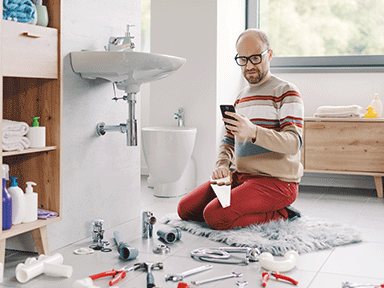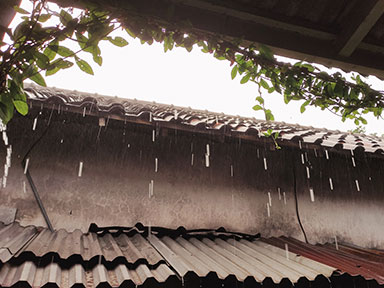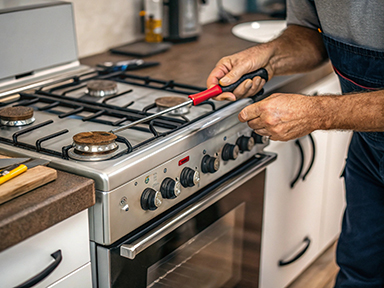Electrical faults can be deadly serious. Do you know what to do if a fault is found at your rental property? If not, read on to find out…
The average household uses around 5,000 to 9,000 kilowatts (kWh) of power every year, according to data from the Australian Energy Regulator. There’s little doubt households rely on the electricity supply, but what can happen if there are electrical faults?
An electrical fault is an abnormal condition in a power system or equipment that interrupts the current flow. Think of it as any electrical issue that prevents the electrical system from turning on, from staying on or from working safely.
Electrical faults occur when the normal flow of electricity is disrupted. This can lead to potential hazards such as fires, shocks, or equipment damage.
What are some of the common electrical faults in homes?
-
Short circuits – occur when live and neutral wires come into direct contact, causing a surge of electricity. Common causes: damaged insulation, faulty wiring.
-
Ground faults – occur when electricity deviates from its intended path and flows directly to the ground. Common causes: damaged wiring, water exposure.
-
Overloaded circuits – occur when too many devices are plugged into a single circuit, causing it to carry more current than it can handle.
-
Arc faults – occur when electrical connections produce high-intensity heat. Common cause: damaged or loose wiring.
-
Loose wiring – occurs when poor connections or ageing wires lead to intermittent power supply, sparking, and overheating.
What can cause electrical faults?
Electrical faults can be caused by a range of issues, including faulty wiring, overloaded circuits from excessive use of power points and extension leads, or malfunctioning RCDs and circuit breakers. Other common culprits include inadequate grounding, outdated systems such as old fuse boards and ageing wiring, and poor installation or maintenance. Damaged components, faulty or outdated appliances, and power surges or spikes can also lead to problems. In some cases, exposed or deteriorated wiring, unqualified DIY electrical work, or environmental factors like moisture, corrosion, or pests are to blame.
Signs of electrical faults
Electrical issues often come with clear warning signs. If you notice any of the following, it’s time to investigate:
-
Flickering, dimming, or fast-burning light bulbs
-
Burning smells or scorch marks near outlets and switches
-
Warm, discoloured, or sparking power points
-
Buzzing or humming sounds from switches or the breaker box
-
Frequent blown fuses or tripped circuit breakers
-
Dead power outlets or sudden outages in certain areas
-
Power surges, voltage dips, or unusual fluctuations
-
Electrical shocks
-
Unexplained spikes in electricity bills
These symptoms can indicate serious underlying problems and shouldn’t be ignored.
So, what should you do if your tenants report there is an electrical fault at your rental?
It’s important to remember that dangerous electrical faults are considered emergency repairs under the residential tenancy act in every state and territory in Australia and must be repaired within legislated timeframes. Failing to do so, can put the landlord and property manager in trouble with the law – and insurance cover at risk (if there is a valid claim associated with the electrical fault).
If there is a serious electrical emergency, such as a fire, your tenants should get out and call 000. If it is safe to do so, ask the tenants to turn off the main power supply immediately to stop the flow of electricity and prevent further harm.
If you have been notified of an electrical fault at the rental
If the property is in a strata complex, notify the strata manager. Meanwhile, you should advise tenants to:
-
Stay clear of water near electrical faults.
-
Keep away from sparking, smoking, or burning outlets, switches, or appliances.
-
Turn off power and unplug any affected devices or fixtures.
-
Avoid overloading power outlets or using appliances with the wrong wattage.
-
Never use outlets or switches that are damaged, warm, discoloured, sparking, or emitting a burning smell.
-
Stop using any appliance that sparks, makes strange noises, or works inconsistently.
-
Never touch damaged wiring or attempt to locate or fix the fault themselves.
-
Stay out of the affected area until it's safe.
Leave it to the experts
If a tenant is injured or their property is damaged while doing something you’ve advised, you could face a legal liability claim. That’s why when it is a dangerous or recurring issue, it is important that you arrange for a licensed electrician to attend the property to handle the task.
Contact a licensed electrician to conduct a thorough inspection to ascertain the source of the fault and take appropriate action. An electrician can supply Certificates of Electrical Safety and have the skills and tools to safely identify any electrical issues and make necessary repairs.
Insurance
If you have experienced loss or damage from an electrical fault, it’s important to contact your landlord insurance provider. They can confirm whether you're covered and guide you through the claims process.
Whether repairs are covered depends on the cause of the fault and any resulting damage. Insurance typically doesn’t cover the cost of simply investigating or fixing a fault if no damage has occurred. This is considered a standard cost of property ownership.
However, if the fault leads to damage (like a fire), a claim may be possible. Most policies cover electrical fires, but there may be exclusions for things like faulty workmanship or old wiring unless the home has been fully rewired. NOTE: If the property was built in an earlier era, some insurers might ask for it to be rewired before they will agree to cover it — it’s just part of the standard checks.
EBM RentCover policies also include motor fusion cover, meaning damage to landlord-supplied appliances caused by electrical faults may also be claimable.
Claims may not be cut-and-dried, so please reach out to a member of our Expert Care team if you have any questions about EBM RentCover landlord insurance and cover for electrical faults – 1800 661 662.
*While we have taken care to ensure the information above is true and correct at the time of publication, changes in circumstances and legislation after the displayed date may impact the accuracy of this article. If you need us we are here, contact 1800 661 662 if you have any questions.
You may also like
View all
Damage caused by tenants and even owners doing DIY repairs or renovations is unlikely to be covered by the landlord’s insurance. We explain…

With a little proactive maintenance, you can significantly lower the risk of nature taking its toll during winter...

If you get a call from your tenants complaining that they can smell gas at the rental, then you’re going to need to know what to do…



